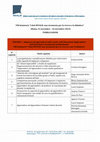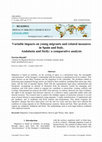Conference Presentations by Patrizia Rinaldi

J-Reading, 2023
Migration is based on mobility, on the crossing of space in a determined time; the inescapable 'p... more Migration is based on mobility, on the crossing of space in a determined time; the inescapable 'precariousness' of the foreigner's relationship with the territory is manifested in all its evidence. This paper focuses on the Mare Nostrum and the migration of the vulnerable.
The problems related to protecting unaccompanied foreign minors are linked to their condition, including their minor age, alien status, and the lack of parental figures. Both with the supranational legal space (international and European), recognising an element of alienation from the domestic system for managing such situations, and with issues related to migrant law contribute to protections, creating conflicts and overlaps. International law protects the child’s best interests; in contrast, domestic law aims to balance the rights of the foreigner and domestic interests of a collective nature (especially public order and internal security).
The research aims to analyse the multiple impacts of protection systems in several areas of great interest to unaccompanied young migrants: 1) rights and protection, 2) employment and job readiness, and 3) Andalusia and Sicily policies and programmes.
This article examines the legislative changes that have taken place over the last two years and how these have affected the condition of young migrants in two Mediterranean countries, Spain and Italy. More specifically, two regions are compared: Andalusia and Sicily. The methodology used is socio-legal analysis combined with empirical research.
Proyecto MigrantchildMed
Menores migrantes en el arco Mediterráneo: movilidad, sistemas de acogid... more Proyecto MigrantchildMed
Menores migrantes en el arco Mediterráneo: movilidad, sistemas de acogida e integración.
Jornada de presentación de resultados del proyecto I+D+i (DER2017-89623-R)
28 de enero de 2022
Ph.D. Workshop Europeanisation and Policy Learning
FUTURES Jean Monnet Centre of Excellence
12 ... more Ph.D. Workshop Europeanisation and Policy Learning
FUTURES Jean Monnet Centre of Excellence
12 October 2020
University of Edinburgh, United Kingdom
CONGRESO INTERNACIONAL MULTIDISCIPLINAR: MIGRACIONES Y PANDEMIA GLOBAL.
INFANCIA, JUVENTUD MIGRAN... more CONGRESO INTERNACIONAL MULTIDISCIPLINAR: MIGRACIONES Y PANDEMIA GLOBAL.
INFANCIA, JUVENTUD MIGRANTE Y OTRAS PERSONAS VULNERABLES
XV Congreso AECPA - LECCIONES Y RETOS POLÍTICOS DE LA PANDEMIA
GT 3.9 Migración y políticas de i... more XV Congreso AECPA - LECCIONES Y RETOS POLÍTICOS DE LA PANDEMIA
GT 3.9 Migración y políticas de incorporación en tiempos de COVID: reformulando agendas, instituciones públicas y actores (online)
Conference in Interdisciplinary Poverty Research - University of Salzburg, September 19-20
International Conference: Migrants and Refugees in the Law- UCAM Catedra Inocencio III - December... more International Conference: Migrants and Refugees in the Law- UCAM Catedra Inocencio III - December 12-14. Murcia (Spain)
International Symposium: “Current Issues on Human Rights”, IPSA RC26, University Carlos III, 23-2... more International Symposium: “Current Issues on Human Rights”, IPSA RC26, University Carlos III, 23-24 May 2019. Madrid (Spain).
Interdisciplinary Doctoral Symposium: "Democracy, Rule of Law and Human Rights in Europe and the ... more Interdisciplinary Doctoral Symposium: "Democracy, Rule of Law and Human Rights in Europe and the World in Times of Contestation". Katholieke Universiteit Leuven, September, 20-21, 2018.
Doctoral Workshop: “Mobility and Security in Europe: accommodating change and upholding values”. ... more Doctoral Workshop: “Mobility and Security in Europe: accommodating change and upholding values”. Leiden Law School, 28-29 June, 2018
International Conference AECPA, ‘Fortaleza Europa: La crisis migratoria y la politica de refugio ... more International Conference AECPA, ‘Fortaleza Europa: La crisis migratoria y la politica de refugio en Europa’, 21-23 September – Universidad de Santiago de Compostela (Spain).
Teaching Documents by Patrizia Rinaldi
SEMINARIO RESMI - JÓVENES DE MINORÍAS ÉTNICAS EN ESPAÑA: OPORTUNIDADES, EXPECTATIVAS Y PROYECTOS ... more SEMINARIO RESMI - JÓVENES DE MINORÍAS ÉTNICAS EN ESPAÑA: OPORTUNIDADES, EXPECTATIVAS Y PROYECTOS DE FUTURO - UNIVERSITY POMPEU FABRA (BARCELONA) -15 MARCH 2019
Papers by Patrizia Rinaldi

International Journal for the Semiotics of Law - Revue internationale de Sémiotique juridique, Dec 16, 2023
Contemporary international migration is directly related to the construction of the nation-state.... more Contemporary international migration is directly related to the construction of the nation-state. The variations in this migration are multiple, depending on the type of mobility, the territories and the characteristics of the people who practice it. One kind of migration that has been particularly important at the end of the twentieth century and so far in the twenty-first century is that of minors who migrate without being accompanied by their parents. The legal definitions, bureaucratic practices and rights of these minors-turned-migrants vary across European states and in the international literature. This paper aims to analyse the terminology used colloquially in the media and academically to refer to this group of people. In the early days of the phenomenon, the acronym MENA (unaccompanied migrant minors) has been the most common in Spain. It was intended to be a "neutral" term used in the legal sphere and migration studies. Still, in recent times, MENA has become more than a descriptive category. It has become a way of criminalising a group of young people who are in national territory and come from another country (usually an African country and, especially, a Maghreb country). However, not everything is determined by the circumstances surrounding us or our lives as social beings. Social pressure, with its narrative, cannot mean leaving aside history, legal culture, and learning. We need a new language to talk about this group of people. Currently, the negative connotation hides the most human aspect of this condition; the term "MENA" is a banner to mystify a fundamental fact: we are talking about children and adolescents who, not being able to count on the protection of an adult or family member, are condemned to social exclusion. This article approaches the migrant child as a critical figure who embodies the paradox of humanitarian reasoning, which is also a legal and political paradox, encapsulating the tension between structural rejection and the individual capacity of the human subject. By focusing on the theoretically productive role of minors without parental guardianship as subjects of ethnographic examination, this paper aims to understand better how current anthropological knowledge redefines the concepts of childhood, adulthood, and migration. The first part of this paper focuses on examining the terminologies used at the European and international levels, with their respective social implications. The second part focuses on the Spanish case, with the different impacts the term produces at the local level. The third and final part focuses on the terminology of refugee children and opens the discussion on scapegoating in Spain.

INVALSI Istituto nazionale per la valutazione del sistema educativo di istruzione e di formazione, 2024
This contribution offers a unique perspective by examining the capabilities and limitations of st... more This contribution offers a unique perspective by examining the capabilities and limitations of standardised tests to assess school settings that include students with a migrant background. It does so by focusing on two distinct education systems, the Italian and the Spanish, to delve into the certification and methods of evaluating the educational background of first- and/or second-generation migrant minors. This unique approach provides a fresh understanding of the educational inclusion of migrant students.
In the Italian case study, the results of the Invalsi tests of pupils with non-Italian citizenship are compared with those of their native peers. The focus is on the differences between 1st and 2nd generation natives and foreigners in the standardised tests of Italian and Mathematics (G8) in the historical series from the 2012/13 to 2021/22 school year. This historical series is of paramount importance as it allows us to distinguish, from a descriptive point of view, the effects of COVID-19 on the school inclusion of a particular student target from those due to structural limits of the Italian school system.
In the Spanish case study, we took two types of evaluations: one organised at the national level by the Evaluation Institute that is carried out at the territorial level every three years by the individual Autonomous Community and a diagnostic evaluation at the territorial level delegated to the individual Autonomous Community and carried out annually, focusing the analysis on the comparison of native pupils with pupils of foreign origin. The methodology has been based on analysing the rules of the main Spanish Educational Laws from 2012 to post-pandemic time, together with participant observation,
interviews or document analysis.
The evaluation of schools should not only focus on academic performance but also on the inclusivity of the school environment. Our research findings underscore the importance of ensuring schools can guarantee similar performance results for students with Italian and Spanish citizenship and potential 'new citizens'. This discovery carries significant implications for educational policies, emphasizing the pressing need for inclusive educational practices.

International Journal for the Semiotic of Law, 2023
Contemporary international migration is directly related to the construction of the nation-state.... more Contemporary international migration is directly related to the construction of the nation-state. The variations in this migration are multiple, depending on the type of mobility, the territories and the characteristics of the people who practice it. One kind of migration that has been particularly important at the end of the twentieth century and so far in the twenty-first century is that of minors who migrate without being accompanied by their parents. The legal definitions, bureaucratic practices and rights of these minors-turned-migrants vary across European states and in the international literature. This paper aims to analyse the terminology used colloquially in the media and academically to refer to this group of people. In the early days of the phenomenon, the acronym MENA (unaccompanied migrant minors) has been the most common in Spain. It was intended to be a "neutral" term used in the legal sphere and migration studies. Still, in recent times, MENA has become more than a descriptive category. It has become a way of criminalising a group of young people who are in national territory and come from another country (usually an African country and, especially, a Maghreb country). However, not everything is determined by the circumstances surrounding us or our lives as social beings. Social pressure, with its narrative, cannot mean leaving aside history, legal culture, and learning. We need a new language to talk about this group of people. Currently, the negative connotation hides the most human aspect of this condition; the term "MENA" is a banner to mystify a fundamental fact: we are talking about children and adolescents who, not being able to count on the protection of an adult or family member, are condemned to social exclusion. This article approaches the migrant child as a critical figure who embodies the paradox of humanitarian reasoning, which is also a legal and political paradox, encapsulating the tension between structural rejection and the individual capacity of the human subject. By focusing on the theoretically productive role of minors without parental guardianship as subjects of ethnographic examination, this paper aims to understand better how current anthropological knowledge redefines the concepts of childhood, adulthood, and migration. The first part of this paper focuses on examining the terminologies used at the European and international levels, with their respective social implications. The second part focuses on Extended author information available on the last page of the article

Hungarian Journal of Legal Studies, 2023
This article analyses an inclusive and participatory approach to regularising 'Non-Asylum Seeking... more This article analyses an inclusive and participatory approach to regularising 'Non-Asylum Seeking Unaccompanied Migrant Minors' in Spain. The terminology is multiple; in this paper, the choice has fallen on Unaccompanied Migrant Minors with the acronym UMMs instead of UAMs, to be consistent with the doctoral thesis already defended in 2021. The term UASC, specific to unaccompanied migrant minors seeking asylum, was excluded. To fully assess the process, it is necessary to account for the following factors shaping their administrative situation: (a) how they reach adulthood, (b) whether they are in regular or irregular situations, and (c) the waiting time for obtaining regularity status and citizenship. This article reviews the gap between perspectives of legal protection, good intentions, and political restrictions. The study has been carried out considering the results of qualitative research obtained through interviews with minors, staff members at reception centres, guardians, and immigration authorities. Particular attention is devoted to the limited number of resident permits granted to the UMMs. The methodology was enriched by desk research; most sources cited in the article are legal instruments and academic papers. The different dimensions of regularization are analysed by paying attention to (i) residence permits and political rights; (ii) the role of guardianship in administrative regularization; and (iii) vulnerability related to the legal status of unaccompanied migrant minors. A comprehensive assessment is carried out based on children's rights and the social, institutional, and organizational contexts, as well as considering the policies which condition the protection milieu concerning migrant children and the practices at both general and operative levels.
Legal Method Lab, 2023
Although migration is part of human history, the creation of nation-states, with the demarcation ... more Although migration is part of human history, the creation of nation-states, with the demarcation of borders, has presented this phenomenon as a watershed between legality and illegality. Despite this, migrants and asylum seekers irregularly use the Mediterranean routes to enter the EU. Within these flows is a specific subgroup of our interest, namely minors without a parent or legal representative. In my recent article "Variable impacts on young migrants and related measures in Spain and Italy. Andalusia and Sicily: a comparative analysis." (1) I deal with the legislative changes

J-Reading, 2023
Migration is based on mobility, on the crossing of space in a determined time; the inescapable 'p... more Migration is based on mobility, on the crossing of space in a determined time; the inescapable 'precariousness' of the foreigner's relationship with the territory is manifested in all its evidence. This paper focuses on the Mare Nostrum and the migration of the vulnerable.
The problems related to protecting unaccompanied foreign minors are linked to their condition, including their minor age, alien status, and the lack of parental figures. Both with the supranational legal space (international and European), recognising an element of alienation from the domestic system for managing such situations, and with issues related to migrant law contribute to protections, creating conflicts and overlaps. International law protects the child’s best interests; in contrast, domestic law aims to balance the rights of the foreigner and domestic interests of a collective nature (especially public order and internal security).
The research aims to analyse the multiple impacts of protection systems in several areas of great interest to unaccompanied young migrants: 1) rights and protection, 2) employment and job readiness, and 3) Andalusia and Sicily policies and programmes.
This article examines the legislative changes that have taken place over the last two years and how these have affected the condition of young migrants in two Mediterranean countries, Spain and Italy. More specifically, two regions are compared: Andalusia and Sicily. The methodology used is socio-legal analysis combined with empirical research.

Studi Emigrazione, 2021
This article is based on a dynamic analysis of the situation of the migrant population in Spain, ... more This article is based on a dynamic analysis of the situation of the migrant population in Spain, during and in face of the pandemic. It begins by examining its consequences in the lives of precarious workers and its repercussions on their future. The methodology used includes a review of the main national and international data sources. Introduzione La Spagna è stato uno dei paesi europei più gravemente colpi-ti dalla pandemia (Orte, Ballester e Nevot-Caldentey, 2020): più di 1.550.000 contagiati e un numero di decessi attestato dall'Istituto Nazionale di Statistica a 42.619 il 20 novembre 2020 (https://www. ine.es/covid/covid_inicio.htm). Il 14 marzo 2020 il governo di Pedro Sanchez ha decretato lo stato di emergenza fino al 21 giugno (Real Decreto 463/2020). La misura, analoga a quella di altri paesi euro-pei, ha obbligato al confinamento domiciliare i cittadini nazionali e stranieri e alla chiusura delle frontiere. Il Consiglio dei Ministri ha approvato il 3 novembre una proroga dello stato di emergenza dal 9 novembre 2020 al 9 maggio 2021. Lo stato di emergenza ha avuto e ha un notevole effetto in mate-ria di immigrazione, perché sono rimasti chiusi gli edifici comunali, le stazioni di polizia, gli uffici per l'immigrazione e i registri civili. Inoltre le procedure amministrative in materia di immigrazione, asilo e nazionalità sono state sospese, pur garantendo i permessi di soggiorno deliberati immediatamente prima del 14 marzo. La stes











Uploads
Conference Presentations by Patrizia Rinaldi
The problems related to protecting unaccompanied foreign minors are linked to their condition, including their minor age, alien status, and the lack of parental figures. Both with the supranational legal space (international and European), recognising an element of alienation from the domestic system for managing such situations, and with issues related to migrant law contribute to protections, creating conflicts and overlaps. International law protects the child’s best interests; in contrast, domestic law aims to balance the rights of the foreigner and domestic interests of a collective nature (especially public order and internal security).
The research aims to analyse the multiple impacts of protection systems in several areas of great interest to unaccompanied young migrants: 1) rights and protection, 2) employment and job readiness, and 3) Andalusia and Sicily policies and programmes.
This article examines the legislative changes that have taken place over the last two years and how these have affected the condition of young migrants in two Mediterranean countries, Spain and Italy. More specifically, two regions are compared: Andalusia and Sicily. The methodology used is socio-legal analysis combined with empirical research.
Menores migrantes en el arco Mediterráneo: movilidad, sistemas de acogida e integración.
Jornada de presentación de resultados del proyecto I+D+i (DER2017-89623-R)
28 de enero de 2022
FUTURES Jean Monnet Centre of Excellence
12 October 2020
University of Edinburgh, United Kingdom
INFANCIA, JUVENTUD MIGRANTE Y OTRAS PERSONAS VULNERABLES
GT 3.9 Migración y políticas de incorporación en tiempos de COVID: reformulando agendas, instituciones públicas y actores (online)
Teaching Documents by Patrizia Rinaldi
Papers by Patrizia Rinaldi
In the Italian case study, the results of the Invalsi tests of pupils with non-Italian citizenship are compared with those of their native peers. The focus is on the differences between 1st and 2nd generation natives and foreigners in the standardised tests of Italian and Mathematics (G8) in the historical series from the 2012/13 to 2021/22 school year. This historical series is of paramount importance as it allows us to distinguish, from a descriptive point of view, the effects of COVID-19 on the school inclusion of a particular student target from those due to structural limits of the Italian school system.
In the Spanish case study, we took two types of evaluations: one organised at the national level by the Evaluation Institute that is carried out at the territorial level every three years by the individual Autonomous Community and a diagnostic evaluation at the territorial level delegated to the individual Autonomous Community and carried out annually, focusing the analysis on the comparison of native pupils with pupils of foreign origin. The methodology has been based on analysing the rules of the main Spanish Educational Laws from 2012 to post-pandemic time, together with participant observation,
interviews or document analysis.
The evaluation of schools should not only focus on academic performance but also on the inclusivity of the school environment. Our research findings underscore the importance of ensuring schools can guarantee similar performance results for students with Italian and Spanish citizenship and potential 'new citizens'. This discovery carries significant implications for educational policies, emphasizing the pressing need for inclusive educational practices.
The problems related to protecting unaccompanied foreign minors are linked to their condition, including their minor age, alien status, and the lack of parental figures. Both with the supranational legal space (international and European), recognising an element of alienation from the domestic system for managing such situations, and with issues related to migrant law contribute to protections, creating conflicts and overlaps. International law protects the child’s best interests; in contrast, domestic law aims to balance the rights of the foreigner and domestic interests of a collective nature (especially public order and internal security).
The research aims to analyse the multiple impacts of protection systems in several areas of great interest to unaccompanied young migrants: 1) rights and protection, 2) employment and job readiness, and 3) Andalusia and Sicily policies and programmes.
This article examines the legislative changes that have taken place over the last two years and how these have affected the condition of young migrants in two Mediterranean countries, Spain and Italy. More specifically, two regions are compared: Andalusia and Sicily. The methodology used is socio-legal analysis combined with empirical research.
The problems related to protecting unaccompanied foreign minors are linked to their condition, including their minor age, alien status, and the lack of parental figures. Both with the supranational legal space (international and European), recognising an element of alienation from the domestic system for managing such situations, and with issues related to migrant law contribute to protections, creating conflicts and overlaps. International law protects the child’s best interests; in contrast, domestic law aims to balance the rights of the foreigner and domestic interests of a collective nature (especially public order and internal security).
The research aims to analyse the multiple impacts of protection systems in several areas of great interest to unaccompanied young migrants: 1) rights and protection, 2) employment and job readiness, and 3) Andalusia and Sicily policies and programmes.
This article examines the legislative changes that have taken place over the last two years and how these have affected the condition of young migrants in two Mediterranean countries, Spain and Italy. More specifically, two regions are compared: Andalusia and Sicily. The methodology used is socio-legal analysis combined with empirical research.
Menores migrantes en el arco Mediterráneo: movilidad, sistemas de acogida e integración.
Jornada de presentación de resultados del proyecto I+D+i (DER2017-89623-R)
28 de enero de 2022
FUTURES Jean Monnet Centre of Excellence
12 October 2020
University of Edinburgh, United Kingdom
INFANCIA, JUVENTUD MIGRANTE Y OTRAS PERSONAS VULNERABLES
GT 3.9 Migración y políticas de incorporación en tiempos de COVID: reformulando agendas, instituciones públicas y actores (online)
In the Italian case study, the results of the Invalsi tests of pupils with non-Italian citizenship are compared with those of their native peers. The focus is on the differences between 1st and 2nd generation natives and foreigners in the standardised tests of Italian and Mathematics (G8) in the historical series from the 2012/13 to 2021/22 school year. This historical series is of paramount importance as it allows us to distinguish, from a descriptive point of view, the effects of COVID-19 on the school inclusion of a particular student target from those due to structural limits of the Italian school system.
In the Spanish case study, we took two types of evaluations: one organised at the national level by the Evaluation Institute that is carried out at the territorial level every three years by the individual Autonomous Community and a diagnostic evaluation at the territorial level delegated to the individual Autonomous Community and carried out annually, focusing the analysis on the comparison of native pupils with pupils of foreign origin. The methodology has been based on analysing the rules of the main Spanish Educational Laws from 2012 to post-pandemic time, together with participant observation,
interviews or document analysis.
The evaluation of schools should not only focus on academic performance but also on the inclusivity of the school environment. Our research findings underscore the importance of ensuring schools can guarantee similar performance results for students with Italian and Spanish citizenship and potential 'new citizens'. This discovery carries significant implications for educational policies, emphasizing the pressing need for inclusive educational practices.
The problems related to protecting unaccompanied foreign minors are linked to their condition, including their minor age, alien status, and the lack of parental figures. Both with the supranational legal space (international and European), recognising an element of alienation from the domestic system for managing such situations, and with issues related to migrant law contribute to protections, creating conflicts and overlaps. International law protects the child’s best interests; in contrast, domestic law aims to balance the rights of the foreigner and domestic interests of a collective nature (especially public order and internal security).
The research aims to analyse the multiple impacts of protection systems in several areas of great interest to unaccompanied young migrants: 1) rights and protection, 2) employment and job readiness, and 3) Andalusia and Sicily policies and programmes.
This article examines the legislative changes that have taken place over the last two years and how these have affected the condition of young migrants in two Mediterranean countries, Spain and Italy. More specifically, two regions are compared: Andalusia and Sicily. The methodology used is socio-legal analysis combined with empirical research.
migratorios. La presencia de estudiantes inmigrantes en la escuela española ha pasado de ser un hecho excepcional a una situación cada vez más común, lo que requiere una profunda reflexión sobre los cambios generados en el sistema educativo en términos de heterogeneidad e integración (Mayoral Peñas, Jiménez Blasco, Sassano y Resino, 2020 ; García Castaño y Carrasco, 2011). La heterogeneidad de los MENA es múltiple, por origen, por nivel de edad y por nivel educativo en los
países de origen.
Para ponderar plenamente el fenómeno es necesario tener conocimiento de su condición administrativa: cómo llegan a la edad adulta, en situaciones regulares o irregulares; cómo se estructura su educación y formación y cuál es su disposición para integrarse en la sociedad de acogida (De Palma Del Teso, 2011; Senovilla and Lagrange, 2011; Duran Ruiz, 2011). La protección se realiza a nivel regional, de las Comunidades Autónomas y Ciudades Autónomas, responsables de su desarrollo humano.
La pregunta de investigación es: ¿Es el sistema de educación y formación adecuado para su integración en la sociedad de acogida? El capitulo se desarrolla siguiendo la brecha entre protección legal, buenas intenciones y restricciones políticas.
The right to education is one of the most vulnerable for migrant children who travel without the company of an adult relative. It is especially relevant that the Convention on the Rights of the Child is to recognize the importance that education has in the development of the person and the suitability of applying it from an early age. This paper evaluates whether the education and training received by MENAs is reflected in their labour market integration, within the broader cost-benefit analysis of the protection system. A multi-method approach is combined with a with socio-legal analysis.
The purpose of this article is to analyze the effectiveness of guardianship systems for children in migration to Spain deprived of parental care, considering the European Union rule of law and the international standards on children’s rights. It examines on the entry strategies implemented with regard to young migrants who confront the provisions established by the Spanish protection system. After an overview of the phenomenon under scrutiny and an introduction to the definition of “unaccompanied migrant minor” (UMM), the article develops in two parts: the first deals with the general guiding lines of the guardianship system for unaccompanied migrant minors arriving in Europe. The second part evaluates the Spanish reception system for the UMM, which mainly concerns the key aspect of guardianship.
The purpose of this work is to analyse the decision of the European Court of Human Rights about the refoulement to the border or the indiscriminate expulsion that is not carried out with the best interests of the minor (Article 3 of UNCRC), and the article 24 (2) of EU Charter of Fundamental Rights.
To what extent and by whom is the right of the child to be heard? This is a crucial question to be answered. The application of article 12 of the UNCRC in the reception process ought to provide agency with the minor, which is fundamental in the integration process. The transition to adulthood is conditioned by such process and the "best interests" is often reshaped, according to the local actors involved.
The open questions are:
a) what factors influence the start-up of new businesses?
b) how do these factors vary between different areas of the country?
c) can the factors relevant to the formation of new businesses be influenced by economic policy and industrial policy in particular?
The included publications engage in four analytical sub-areas which are linked with the main research questions: Frontier, Reception, Guardianship, and Transition to Adulthood.